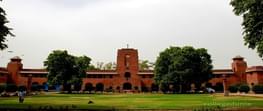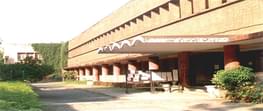Delhi University B.Com : Fees 2025, Course Duration, Dates, Eligibility
Course Description
Delhi University B.Com General is offered as a 3 Degree program. The course is offered as a Full Time On Campus program. The total B.Com General Fee 2024 at Delhi University is 21,390.
Candidates must have at least 10+2 to be eligible for admissions.
Delhi University B.Com General Previous Fees
| Year (2024 - 2025) | year 1 | year 2 | year 3 |
|---|---|---|---|
| Caution fee | - | - | - |
| University Fees | - | - | - |
| college welfare fund | - | - | - |
| university welfare fund | ?250 | ?250 | ?250 |
| union fees | - | - | - |
| development fees | ?1200 | ?1200 | ?1200 |
| transport fees | - | - | - |
| gym fees | - | - | - |
| library fees | - | - | - |
| lab fees | - | - | - |
| convocation fees | - | - | - |
| alumni fees | - | - | - |
| training and placement fees | - | - | - |
| miscellaneous fees | ?5680 | ?5680 | ?5680 |
| total year wise fees | ?7130 | ?7130 | ?7130 |
| Yearly Fees | 7130 | 7130 | 7130 |
Course Details
Delhi University B.Com admission 2024 is ongoing. DU CSAS UG 2024 application form correction window is open till August 04. Candidates who have applied for admission to B.Com /B.Com (Hons) at affiliated colleges of Delhi University can make corrections to their application form on the CSAS(UG) dashboard (ugadmission.uod.ac.in). DU CSAS UG Phase 2 schedule for filling college/course preferences will be announced soon.
B.Com and B.Com (Hons.) programs in Delhi University are offered by more than 50 colleges. Some popular colleges offering B.Com and B.Com Honors programs include Kirori Mal College, Gargi College, Delhi College of Arts and Commerce, Aryabhatta College, Atma Ram Sanatan Dharma College, etc. Delhi University will start registrations for the seat allotment process after the CUET UG result declaration. Candidates who appeared for the CUET UG examination can register on the Delhi University’s Common Seat Allocation System (CSAS) portal at ugadmission.uod.ac.in. CSAS UG application fee is INR 250 for UR/OBC-NCL/EWS and INR 100 for SC/ST/PwBD candidates. Check DU Admission 2024
Table of Content
Delhi University B.Com Eligibility Criteria
- Candidates must have passed the 10+2 or higher secondary exam with an aggregate of 40% marks in the qualifying examination.
- Selection will be done on the basis of marks secured in qualifying examination including one language and three best subjects as per the following: An aggregate of 40% or above in Hindi/English and a combination of the best three among the following subjects: Mathematics, Economics, Accountancy, and Business Studies/ Commerce.
Delhi University B.Com Admission Criteria
Candidates applying for B.Com admission at Delhi University except (DU SOL and NCWEB) must clear the Common University Entrance Test (CUET UG). Those who qualify the entrance examination will be required to register on Delhi University’s Common Seat Allocation System (CSAS) portal for seat allocation. The admission process includes three phases, in the first phase aspirants are required to fill the CSAS portal by visiting the official website – ugadmission.uod.ac.in. Phase 2 includes filling out programs and college preferences and seat allotment will be done in the third phase. The university will be conducting multiple rounds of seat allocation based on the colleges and programs combination filled by students. Selected candidates then can choose to accept/freeze or upgrade their seats by the given date. Upon acceptance of a seat, the respective college will check eligibility, verify documents, and confirm admission after receiving the fee payment.
Admission through Sports and Extracurricular Activities (ECA): Candidates are required to appear in a performance test along with the CUET. Selection of candidates will be made on the basis of combined score of CUET (25%) and performance test (75%). Certificates will also be considered for the same along with the CUET score.
Seat Reservation: As per the DU admission policy, 50% seats are reserved for minorities in colleges like St. Stephens. 85% of marks for admission will be taken from the CUET, and the remaining 15% will be decided by colleges. Admission to the remaining 50% seats will be done on the basis of CUET marks only.
Delhi University B.Com Application Process
Candidates seeking admission to more than 90 affiliated colleges of Delhi University must register for CUET examination first and then on Delhi University’s Common Seat Allocation System (CSAS). The application process for Delhi University UG admisisons is mentioned below:
Delhi University B.Com Application Process Through CUET UG
- Candidates must visit the official CUET UG official website at exams.nta.ac.in/CUET-UG.
- Upon opening the website candidates will find the ‘Register’ tab, they must click on it.
- After reading and understanding the information provided, candidates must hit the ‘Proceed’ button.
- After this, candidates will be directed to the application form. Candidates must fill in the required details carefully.
- After filling the necessary details candidates will have to upload important documents such as signature, photograph, marksheet, etc. Candidates must upload all the required documents.
- Candidates need to pay the application fee at the time of submitting the form or else the Online Application Form will not be considered.
- After submitting the fee, candidates print out the form and save a hard copy for future reference.
Delhi University Common Seat Allocation System (CSAS) Application Process
- Visit the official website of Delhi University – admission.uod.ac.in or CSAS portal – ugadmission.uod.ac.in.
- Click on “Register” in the menu bar.
- Read all the information carefully and then click on “proceed”.
- Enter your personal and academic details.
- Submit the necessary documents such as photograph, signature, class X marksheet, category certificate.
- Pay an application fee through credit card/debit card/net banking/UPI/etc.
- Submit the application form.
- Take a printout of application form for future reference.
Check More: Delhi University Affiliated Colleges
CUET Exam Pattern
- CUET is divided into 3 sections. First is language, second is “Domain-specific topics”, and third one is general knowledge.
- Candidates are required to appear in at least one language out of 33 languages.
- Candidates have to choose at least three subjects which they have taken in class 12th as domain-specific topics for section 2.
- Candidates can appear for CUET in a maximum of six subjects out of which one must be a language subject.
- For B.Com admission, Candidates must appear in CUET in any of the following subject combinations:
Combination I: Any one Language from List A + Any two subjects from List B1 + Any one subject from either List B1 or List B2
OR
Combination II: Any one Language from List A + Any one subject from either List B1 or List B2 + SECTION III of CUET (General Test)
Merit will be based on the best CUET scores obtained from any of the above-mentioned combinations of subjects.
Check CUET Exam Pattern
Delhi University B.Com Course Details
The syllabus and scheme of examination for the B.Com program are based on the choice based credit system. The course work is extended for three years that is for six semesters. Each semester has an end term examination through which the performance of students in academics is analyzed.
The B.Com. course curriculum is well-structured with core courses, discipline-specific elective courses, generic elective courses, dissertation/project.
Here are the semester wise courses of B.Com:
| Semester | Course |
|---|---|
| I |
|
| II |
|
| III |
|
| IV |
|
| V |
Discipline-Specific Elective I: Anyone
Discipline-Specific Elective II: Anyone
Skill-based: Anyone
Generic Elective I :
|
| VI |
Discipline-Specific Elective III:
Skill-based:
Discipline Specific Elective IV
Generic Elective:
|
Delhi University B.Com Placements
Central Placement Cell assures that the students are placed in reputed companies, Government jobs and other private sectors. The cell provides an excellent guidance & support to the students, and helps them to achieve suitable jobs in reputed organizations after Graduation completion. As per the NIRF 2024 report submitted by Delhi University, the median salary package offered to UG (3-year) students was INR 5.5 LPA in 2023.
The placement process involves:
Pre Placement Process:
- Placement Presentation
- Placement Talks
- Slot allocation
Placement Process:
- Written or Online Test
- Group Discussion
- Personal Interviews
Read more: DU Placements
Delhi University B.Com FAQs
Ques. Does Delhi University conduct any entrance exam for B.Com. admission?
Ques. Do I need to visit the Delhi University campus to apply for B.Com Admission?
Ques. What is the percentage to be maintained in order to get the B.Com degree at Delhi University?
Ques. What are the opportunities available for the students with B.Com Qualification from Delhi University?
Ques. Why should I choose Delhi University for B.Com?
Important Updates
Course Finder
Search from 20K+ Courses and 35+ Streams
Popular Streams:
Why To Join Delhi University - Reviews & Rating
Fees and Financial Aid:
Fees and Financial Aid:
Fees and Financial Aid:
Fees and Financial Aid:
Fees and Financial Aid:
Fees and Financial Aid:
Fees and Financial Aid:
Fees and Financial Aid:
Do you think the data is wrong ? Report Here
Delhi University Latest News
Delhi University to Launch Two Distinct Portals for UG & PG Courses Admissions 2023

DU Attracts Highest CUET UG Applications, Accompanied by BHU and Allahabad University: UGC Chairperson


NIHFW Delhi Gets Clearance from DU Committee to Start MPH Degree Program


Discover More Colleges
![Jamia Millia Islamia University-[JMI]](https://image-static.collegedunia.com/public/college_data/images/appImage/25460_JMI_APP.jpg?h=111.44&w=263&mode=stretch)

![Lady Shri Ram College for Women - [LSR]](https://image-static.collegedunia.com/public/college_data/images/appImage/14918218951444135101LSRCNEW.jpg?h=111.44&w=263&mode=stretch)





![Jawaharlal Nehru University - [JNU]](https://image-static.collegedunia.com/public/college_data/images/appImage/25461_JNU.jpg?h=111.44&w=263&mode=stretch)

![Dyal Singh College - [DSC]](https://image-static.collegedunia.com/public/college_data/images/appImage/1239_DSC_New.jpg?h=111.44&w=263&mode=stretch)


![Delhi University - [DU]](https://image-static.collegedunia.com/public/college_data/images/logos/1491817267UniversityofDelhi.png?h=71.7&w=71.7&mode=stretch)






.jpeg)

.jpeg)


![Aditi Mahavidyalaya - [AMV]](https://image-static.collegedunia.com/public/college_data/images/logos/1491907072logo.png?h=72&w=72&mode=stretch)
![Atma Ram Sanatan Dharma College - [ARSD]](https://image-static.collegedunia.com/public/college_data/images/logos/1491912596logo.png?h=72&w=72&mode=stretch)
![Bhagini Nivedita College - [BNC]](https://image-static.collegedunia.com/public/college_data/images/logos/1395655310Bhagini Nivedita College.png?h=72&w=72&mode=stretch)
![Bharati College - [BC]](https://image-static.collegedunia.com/public/college_data/images/logos/1395656554Bharati College.png?h=72&w=72&mode=stretch)
![Dr. Bhim Rao Ambedkar College - [BRAC]](https://image-static.collegedunia.com/public/college_data/images/logos/1492411231logo.png?h=72&w=72&mode=stretch)
![College of Vocational Studies - [CVS]](https://image-static.collegedunia.com/public/college_data/images/logos/1492415426logo.png?h=72&w=72&mode=stretch)
![Daulat Ram College - [DRC]](https://image-static.collegedunia.com/public/college_data/images/logos/1507912339daulatramcollegelogo.png?h=72&w=72&mode=stretch)

![Delhi College of Arts and Commerce - [DCAC]](https://image-static.collegedunia.com/public/college_data/images/logos/1491999035logo1.jpg?h=72&w=72&mode=stretch)
![Delhi School of Economics, University of Delhi - [DSE]](https://image-static.collegedunia.com/public/college_data/images/logos/1703734276mbadsebacombined1.png?h=72&w=72&mode=stretch)



.png?h=72&w=72&mode=stretch)



![Department of Business Economics, University of Delhi - [DBE]](https://image-static.collegedunia.com/public/college_data/images/logos/1425462742Capture.jpg?h=72&w=72&mode=stretch)
![University of Delhi, Department of Financial Studies - [DFS]](https://image-static.collegedunia.com/public/college_data/images/logos/1690192927Untitled.jpg?h=72&w=72&mode=stretch)



![Amity School of Communication - [ASCO]](https://image-static.collegedunia.com/public/college_data/images/logos/1412072889download.jpg?h=72&w=72&mode=stretch)
![Savitribai Phule Pune University - [SPPU]](https://image-static.collegedunia.com/public/college_data/images/logos/1483942831uop_logo.jpg?h=72&w=72&mode=stretch)
![Gargi College - [GC]](https://image-static.collegedunia.com/public/college_data/images/logos/1506399496zsdmnnmnmsdfdf.png?h=72&w=72&mode=stretch)
![Maharaja Agrasen College - [MAC]](https://image-static.collegedunia.com/public/college_data/images/logos/1559622404logo.png?h=72&w=72&mode=stretch)

![Annamalai University - [AU]](https://image-static.collegedunia.com/public/college_data/images/logos/1394440386Annamalai University.png?h=72&w=72&mode=stretch)
![Pondicherry University - [PU]](https://image-static.collegedunia.com/public/college_data/images/logos/1503565250logonew1.png?h=72&w=72&mode=stretch)



![Shyam Lal College - [SLC]](https://image-static.collegedunia.com/public/college_data/images/logos/14874215540.jpg?h=72&w=72&mode=stretch)
![Jesus and Mary College - [JMC]](https://image-static.collegedunia.com/public/college_data/images/logos/1491887841col2177.jpg?h=72&w=72&mode=stretch)

![K J Somaiya College of Arts & Commerce - [KJSAC]](https://image-static.collegedunia.com/public/college_data/images/logos/1479289303logo.png?h=72&w=72&mode=stretch)



Comments